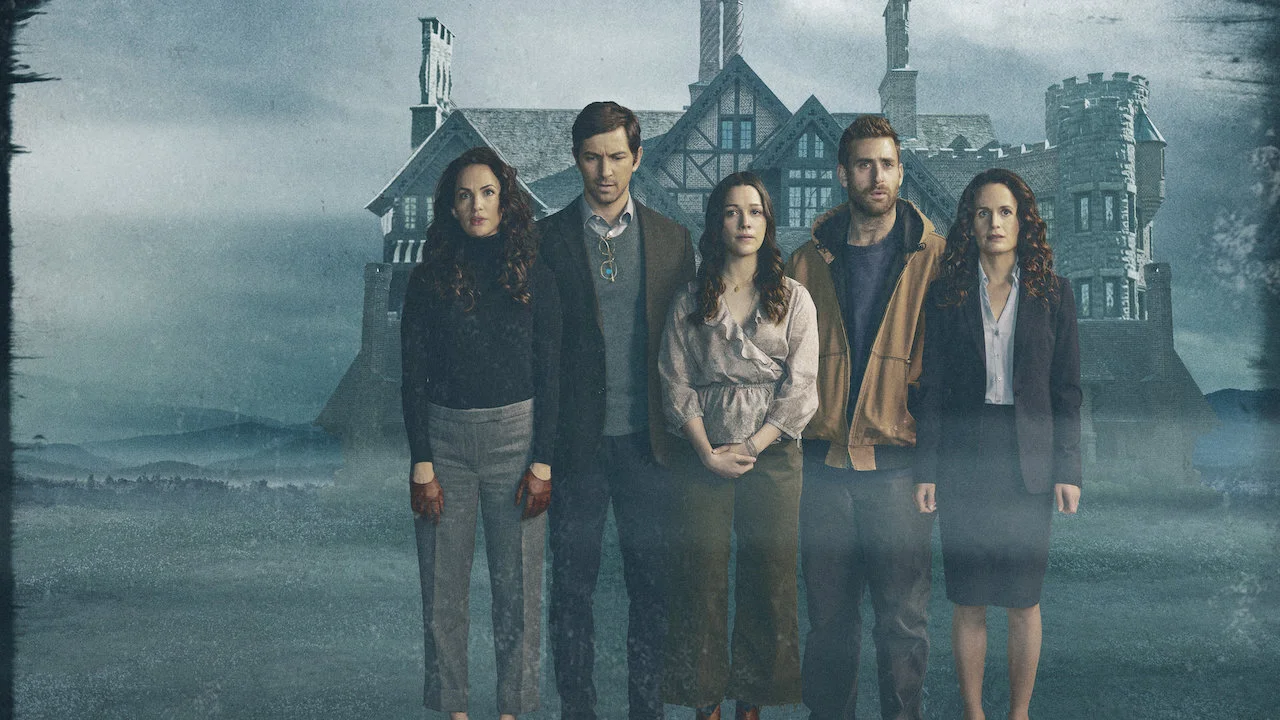[TV Review] The Haunting of Hill House
“When we die, we turn into stories; and every time someone tells one of those stories, it’s like we’re still here for them.”
Loosely based on the infamous 1959 novel of the same name by Shirley Jackson, The Haunting of Hill House takes place over two separate timelines and follows the lives of the Crain family, following a tragic and mysterious incident that changes the course of each of their futures forever.
In the summer of 1992, we meet Hugh and Olivia Crain (Henry Thomas and Carla Gugino). Hugh is the matriarch of his family – warm, loving and everything you imagine the perfect dad to be – complete with DIY skills. Olivia is both ethereal and majestic, strong but free spirited - the kind of mother that nurtures her children but teaches them how to think for themselves.
When the Crains move their young family into Hill House, an old abandoned mansion which they plan to renovate and sell on in order to build their ‘forever home’, they underestimate the amount of work required. As the picture becomes clearer, and the realisation sets in that the repairs are going to be even more time and money consuming, they resign themselves to the fact that they will need to stay longer than they initially planned.
However, mould and leaks are the least of their worries when their children become increasingly frightened of the goings on at Hill House. The youngest, twins Nell and Luke (Violet McGraw and Julian Hilliard), are seeing people that aren’t there, and the eldest and middle daughters Shirley and Theodora (Lulu Wilson and Mckenna Grace) are hearing noises that no one else can hear. At first Hugh and Olivia explain away the encounters with nightmares and “old creaky houses” having “old creaky walls”, but as Olivia’s psychological state rapidly starts to decline, Hugh, and his eldest son Steven (Paxton Singleton), begin to wonder if there is something more sinister at play.
Things rapidly escalate, and before they know it, the Crain children are being ripped from their beds in the middle of the night, shoved into the family car and driven away from Hill House, leaving behind their mother with it. Hugh leaves the younger children in a motel room, under the protection of Steven, and when he returns covered in blood, the mystery behind the events of that night only grows.
“Mom says... that a house is like a body... and that every house... has eyes. And bones. And skin. And a face.”
Twenty-six years later Nell, Luke, Shirley, Theo and Steven (now Victoria Pedretti, Oliver Jackson-Cohen, Elizabeth Reaser, Kate Siegel and Michiel Huisman), are all estranged from their father (now Timothy Hutton), and are barely clinging on to one another. Their family has been torn apart by the mystery from their childhood that, we come to learn, resulted in the death of their mother. No one knows how or why, and Hugh isn’t talking. Nell blames the house; Luke turns to drugs to drown out any theories; Theo, to alcohol and casual sex, and eldest siblings Shirley and Steven believe that Olivia simply took her own life due to mental illness.
Throughout the series we see how the events in the weeks leading up to, and of that fateful night, play out for each of the Crain children, and how it has subsequently shaped them into the adults they are today. When tragedy strikes again, each of them begin to experience vivid memories of Hill House and are haunted by visions of spectral figures... but are they real? Or are they just a result of suppressed trauma? Of guilt, addiction, depression?
Despite how terrifying things are on the surface of this show – the myriad of hidden spectres to look out for, and the ones that creep through their rooms at night – and despite having one of the best and most shocking jump scares in TV history, the real horror of Hill House lies in the Crain’s shared grief, and the missed opportunities to truly be a family, to tell the truth, and to come together to work through the ghosts that plague them all.
“A ghost can be a lot of things. A memory, a daydream, a secret, grief, anger, guilt...”
Writer and Director Mike Flanagan is no stranger to portraying grief in horror. In his 2011 film Absentia, a woman and her sister begin to experience strange and terrifying visions of her missing husband, who she has recently declared dead in absentia. It’s a completely heart-breaking and chilling experience to watch. His other works such as 2013’s Oculus and 2016’s Before I Wake also both deal with family bereavement, illness, loss and grief, whilst delivering scares throughout. Oculus was also the inspiration behind setting The Haunting of Hill House over the course of two timelines, with Flanagan stating “It’s a structure I first started to play with during Oculus and I really enjoyed that. I’d always wanted to push it further, and this seemed like the perfect opportunity. Having 10 hours to play with really opened up the structure and gave us a chance to focus on each character and their limited perspective on the events of both the past and present.”
The Haunting of Hill House is surely Flanagan’s greatest success thus far though, creating a series full of characters that you rapidly fall in love with, care for and grieve for. With this series, he has done what so many others fail to do when creating horror, by perfecting the pacing of each episode. A lot of horror films often struggle with the average 90–120-minute run time, and too much is crammed in, with the finale feeling rushed and unsatisfying. With horror tv, it seems that one of two things happen – shows go on and on until the ratings drop, viewer interest is lost, and they’re criticised for only being in it for the money e.g. The Walking Dead, OR they barely make it past one or two seasons, because the quality decreases and once-devoted fans are left disappointed e.g. Penny Dreadful.
Although the quantity is limited at just 10 episodes, Flanagan delivers only the highest of quality with each hour of Hill House.
It’s hard to imagine that I will ever care about the fate of 5 children as much as I did the Crain’s. The young performers here are each owed their dues, dealing with scenes and scenarios that children should never really have to face. They all act with such conviction, it’s hard not to want to protect them personally.
The performances from the adult cast parallel them without fault. Nell and Luke (McGraw, Hilliard, Pedretti and Jackson-Cohen) are standouts, each portraying their relationship so brilliantly you would think that they are the same people twenty-six years apart, and that their ‘twin thing’ is non-fiction.
However, the most overwhelmingly strong performance in the whole series must go to Henry Thomas and Timothy Hutton as Hugh. You may ask yourself why two different actors were cast to play the same person twenty-six years apart. Why not use effects to age Henry, or de-age Timothy? The answer isn’t clear, but honestly doesn’t matter. The fact is, they are both astonishing here. The level of emotion, trauma, fear and love conveyed just through the way each of them holds themselves, their expressions and their line delivery are just gut wrenching. If you don’t feel for Hugh wholeheartedly by the end of the series, you haven’t been paying attention.
“You know, look, we weren't perfect, but we were always kind. And we loved each other hard. And I love her today just as much as I did in the beginning."
As I re-watched the show for this review (not my first re-watch since its release in 2018), I shed many a tear knowing what was to come for each of the characters, and by the finale I was yet again a blubbering mess. I’m not ashamed to say that some days I will listen to The Newton Brothers’ incredible score for The Haunting of Hill House and find myself choked up. It’s truly exquisite.
The Haunting of Hill House is a haunted house tale like no other. Ultimately it is the story of two parents’ love for their children - both well-intentioned but misguided in their actions - and the lasting impact it has on them and everyone around them. It’s the story of siblings learning to accept the faults of the people who worked so hard to protect them, the faults in each other, and the faults in themselves.
Incredibly well crafted, superbly acted, visually stunning, with a score that can chill you to the bone and warm your soul retrospectively. The Haunting of Hill House is a flawless heartbreaker of a horror.































![[TV Review] Junji Ito Maniac: Japanese Tales of the Macabre (2023)](https://images.squarespace-cdn.com/content/v1/5fe76a518d20536a3fbd7246/1675626891240-UYL6BTD1GV9I3UEUQPZG/image2.jpg)
![[TV Review] Dead Set (2008)](https://images.squarespace-cdn.com/content/v1/5fe76a518d20536a3fbd7246/1664787670655-G8UTH9HDQCNBIE6K9WA2/Screenshot+2022-10-03+at+09.58.28.png)
![[TV Review] Buffy The Vampire Slayer (1997- 2003)](https://images.squarespace-cdn.com/content/v1/5fe76a518d20536a3fbd7246/1664172852528-QN3YQI0K5M7OHWXY1EKR/buffy.jpeg)
![[TV Review] The Chilling Adventures of Sabrina (2018-2020)](https://images.squarespace-cdn.com/content/v1/5fe76a518d20536a3fbd7246/1664172038833-EBYFI7STZ97CMI13AR99/SABRINA2.jpeg)
![[Editorial] “I control my life, not you!”: Living with Generalised Anxiety Disorder and the catharsis of the Final Destination franchise](https://images.squarespace-cdn.com/content/v1/5fe76a518d20536a3fbd7246/1696444478023-O3UXJCSZ4STJOH61TKNG/Screenshot+2023-10-04+at+19.30.37.png)
![[Film Review] Sympathy for the Devil (2023)](https://images.squarespace-cdn.com/content/v1/5fe76a518d20536a3fbd7246/1697186986143-QDVLQZH6517LLST682T8/Screenshot+2023-10-13+at+09.48.52.png)
![[Film Review] Kill Your Lover (2023)](https://images.squarespace-cdn.com/content/v1/5fe76a518d20536a3fbd7246/1697465940337-T55VQJWAN4CHHJMXLK32/56_PAIGE_GILMOUR_DAKOTA_HALLWAY_CONFRONTATION.png)
![[Film Review] Shaky Shivers (2022)](https://images.squarespace-cdn.com/content/v1/5fe76a518d20536a3fbd7246/1696442594997-XMJSOKZ9G63TBO8QW47O/Screenshot+2023-10-04+at+18.59.33.png)
![[Film Review] V/H/S/85 (2023)](https://images.squarespace-cdn.com/content/v1/5fe76a518d20536a3fbd7246/1697455043249-K64FG0QFAFVOMFHFSECM/MV5BMDVkYmNlNDMtNGQwMS00OThjLTlhZjctZWQ5MzFkZWQxNjY3XkEyXkFqcGdeQXVyMTUzMTg2ODkz._V1_.jpg)

![[TV Review] Supernatural (2005-2020)](https://images.squarespace-cdn.com/content/v1/5fe76a518d20536a3fbd7246/1655573865841-QLDABX1BTQD62WL5171W/Image%2B1%2B%25284%2529.jpg)
![[TV Review] Scream TV Series (2014) Season 1](https://images.squarespace-cdn.com/content/v1/5fe76a518d20536a3fbd7246/1655656570649-S2516JEUBDALYLSRZT04/Screen-shot-2015-06-30-at-6.55.43-PM.png)
![[TV Review] Marianne (2019)](https://images.squarespace-cdn.com/content/v1/5fe76a518d20536a3fbd7246/1642852814142-Q7N595RY5ECXF1XKRC34/marianne+top.jpeg)
![[TV Review] Boris Karloff: The Man Behind the Monster (2021)](https://images.squarespace-cdn.com/content/v1/5fe76a518d20536a3fbd7246/1644088673462-SM7VB9ORKL7LFYE3RLGA/Image+1+%283%29.jpg)
![[TV Review] The Boulet Brothers’ Dragula Season 4](https://images.squarespace-cdn.com/content/v1/5fe76a518d20536a3fbd7246/1640260117973-N8H35J9LC5TBNV8SUFBU/Image+1+%283%29.png)
![[TV Review] Behind The Monsters (2021)](https://images.squarespace-cdn.com/content/v1/5fe76a518d20536a3fbd7246/1636655798596-NOAWXH9FGRLY4TVXUPSX/Image+1+%285%29.jpg)
